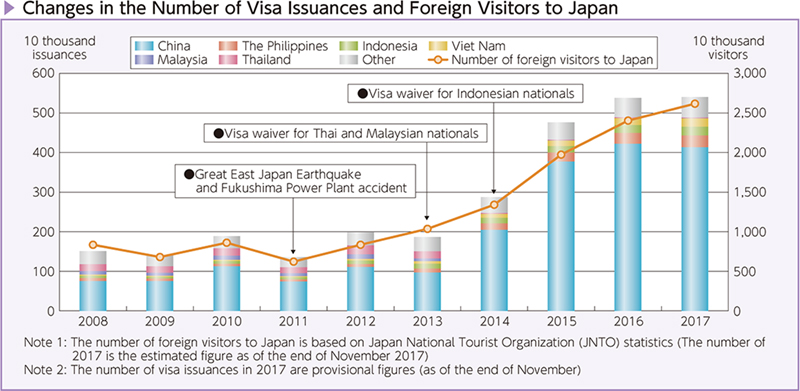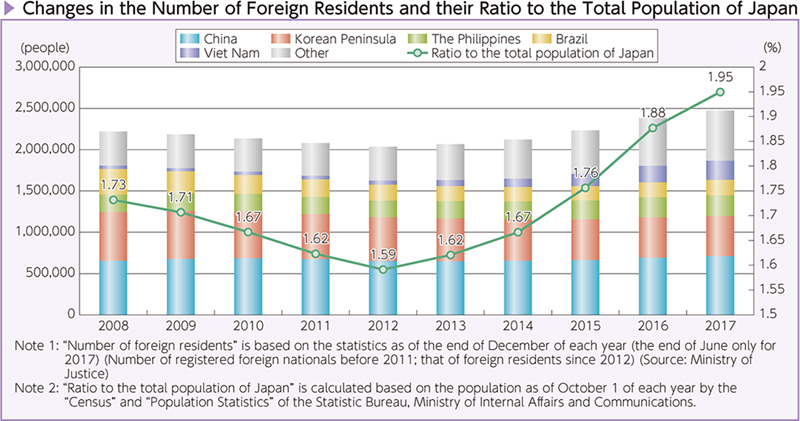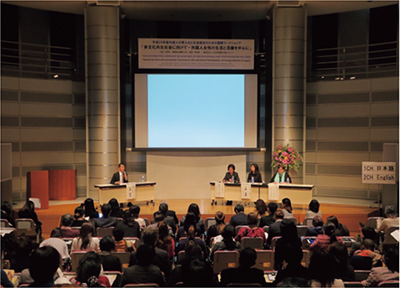Diplomatic Bluebook 2018
Chapter 4
Japan's Diplomacy Open to the Public
1 Linking the Energy of Foreign Nationals to the Growth of Japan
(1) Growth Strategy and Relaxation of Visa Requirements
In 2017, the number of foreign visitors to Japan reached the highest on record at 28.69 million. The Government of Japan set new goals for the number of foreign visitors to 40 million in 2020 and 60 million in 2030 in the “Tourism Vision to Support the Future of Japan” issued at the end of March 2016. In the Vision, it is stated that the Government will engage in strategic relaxation of visa requirements for the five countries of China, Russia, India, the Philippines and Viet Nam, for which visas are required to visit Japan despite their high market potential to attract tourists. Based on these, in 2017, MOFA again engaged in examining and implementing strategic relaxation of visa requirements not only for these five countries but also for other countries from the perspective of promoting people-to-people exchanges and strengthening bilateral relations, etc. Specifically, the introduction of multiple entry visas for tourism purposes, etc. for Russian nationals began on January 1, 2017, the simplification of visa application procedures for Indian students and the expansion of the number of visa application sites was instituted on February 1, the relaxation of single and multiple entry tourist visas for Chinese nationals began on May 8, the visa exemption for nationals of the United Arab Emirates who have pre-registered their passports began on July 1, and the relaxation of multiple entry visas for nationals of CIS countries (Azerbaijan, Armenia, Ukraine, Uzbekistan, Kazakhstan, Kyrgyzstan, Tajikistan, Turkmenistan, Belarus and Moldova) and Georgia was also instituted on July 1. In addition, Japan instituted a working holiday program with Hungary, Spain and Argentina.

As described above, further expansion of the relaxation of visa requirements is expected as it is effective for promoting people-to-people exchanges and Japan's economic growth. On the other hand, the Government intensifies visa control as a part of border measures to prevent the entry of criminals and foreign visitors with the intention of illegal labor, as well as those who could become victims of human trafficking. MOFA is determined to continue working on the relaxation of visa requirements, aiming to increase the number of visitors to Japan while maintaining “Japan, the safest country in the world,” and contribute to achieving a tourism-oriented country both in quality and quantity and attract the wealthy class, repeat visitors, and the young generation. Also, MOFA intends to conduct such relaxation of visa requirements from a comprehensive perspective, taking into account factors such as bilateral relations and their diplomatic significance.
(2) Acceptance of Foreign Nationals and their Social Integration
Since the financial crisis in 2008, the number of long-term foreign residents in Japan had kept decreasing until 2012 when the trend turned upward. While the aging of the population continues with low birth rate resulting in the decrease of the population, it is important for Japan to secure capable human resources, irrespective of their nationality, in order to further vitalize Japan's economy and improve its competitiveness. The “Investments for the Future Strategy 2017” specifically aims at an effective utilization of foreign human resources, and it is expected that the number of competent foreign nationals living in Japan will further increase in the future.

MOFA cooperates with the relevant ministries and agencies to assure the series of measures to be considerable and effective to the principle of human rights of the foreign nationals. MOFA also hosts “International workshops on acceptance of foreign nationals and their integration into Japan,” aiming to encourage debate among the people by providing opportunities to discuss concrete challenges and measures. In March, MOFA co-hosted a workshop with the International Organization for Migration (IOM) under the theme of “Toward an Intercultural Society: Focusing on Life and Active Participation of Foreign Women in Japan.” The participants mainly discussed how women from foreign countries can live and play an active role in Japanese society.
 International workshop on acceptance of foreign nationals and their integration into Japanese society (March 1, Tokyo)
International workshop on acceptance of foreign nationals and their integration into Japanese society (March 1, Tokyo)In June, MOFA and the Tokyo Metropolitan Government co-hosted the Disaster Management Seminar for Diplomatic Missions and Foreign Delegations in Tokyo, in order to facilitate and reinforce information communication as well as collaboration with diplomatic missions and foreign delegations in Tokyo, considering the Tokyo Olympic and Paralympic Games set to take place in 2020.
